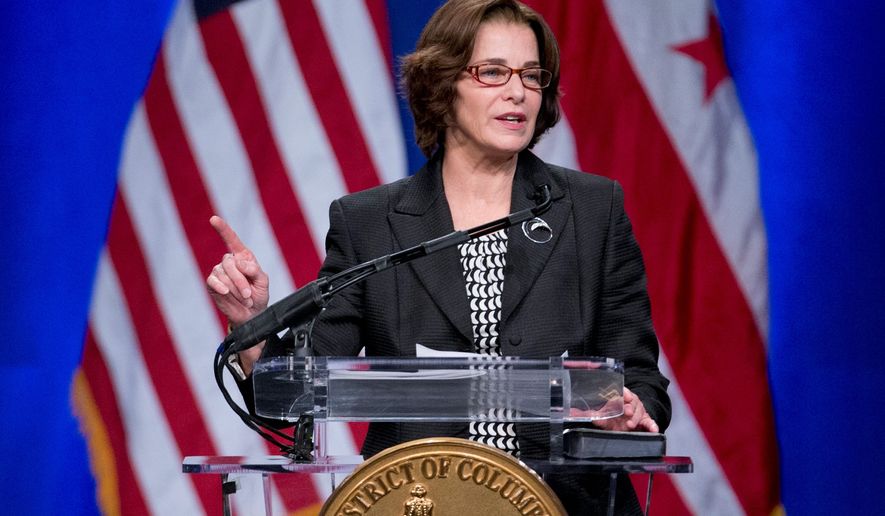D.C. lawmakers moved Tuesday to change the new paid family leave law, aiming to reduce government involvement in its administration and its payroll tax on city businesses.
A bill introduced Tuesday by council member Mary Cheh, Ward 3 Democrat, would create a mandate for big businesses to fund and administer paid family and medical leave for themselves. For smaller businesses, it would let stand the government-run program funded by smaller payroll taxes.
“I believe the government administration it established was too large,” Ms. Cheh said of the Universal Paid Leave Act, which became law last week. “I believed the tax was too high on all of our businesses, and I believed that employers who were already providing paid leave deserved more flexibility.”
Fellow Democratic council members Jack Evans of Ward 2 and Vincent Gray of Ward 7 joined Ms. Cheh in supporting her proposal.
Currently, the law imposes a 0.62 percent payroll tax on all local businesses to fund the paid leave program, which is administered by the city. It provides up to eight weeks of family or medical leave to private-sector workers in the District.
Lawmakers overwhelmingly approved the legislation in December over the reservations of some council members, like Mr. Evans, concerned about its cost to businesses and the city.
Mayor Muriel Bowser, who also had expressed concerns about its costs, allowed the bill to become law without her signature last week.
“It’s one of the most irresponsible bills we’ve passed,” Mr. Evans, the council’s longest-serving legislator, said Tuesday. He cited the often-noted city labor statistic that nearly two-thirds of the District’s 532,000 workers live in Maryland or Virginia, meaning the lion’s share of the program’s benefits would be spent out of town.
Under Ms. Cheh’s proposal, businesses with payrolls of at least $3.5 million or with at least 50 employees would pay for and administer their own paid leave programs. Businesses below those thresholds would take part in the government-run program, which would be funded by a 0.2 percent payroll tax on large businesses and a 0.4 percent tax on small ones.
“I believe that the hybrid bill I introduce today addresses the concerns of small business while also allowing flexibility for larger ones to implement their own programs, so long as it meets our minimum standards,” Ms. Cheh said Tuesday on the dais.
She said her bill would cut by two-thirds the program’s estimated $250 million annual cost. The city’s start-up costs could range from $40 million to $80 million for designing technology infrastructure and hiring 113 government workers to administer the program.
Bowser spokesman Kevin Harris said the mayor is reviewing the proposal but is “supportive of [Ms. Cheh’s] efforts to put forward an alternative that could help to address many of our concerns regarding cost and ensuring that more benefits go to District families instead of Maryland and Virginia residents.”
“I think it speaks to the appetite from both the mayor’s office and council members to find a better way to deliver paid leave to D.C. families,” Mr. Harris said.
Miss Bowser’s inaction on the original legislation angered businesses, who wanted her to strike down the program, and labor advocates, who wanted her to take a stand for paid leave benefits.
The Campaign for D.C. Paid Family Leave tweeted out during the council meeting that Ms. Cheh was “cowering to big biz lobby.”
Linda Benesch, a paid family leave supporter, also took to Twitter to voice opposition to the Cheh bill.
“Two years were spent crafting, debating & passing #PaidLeave4DC — further delays to pander to big biz lobby are a terrible idea,” Ms. Benesch tweeted. “This is so disappointing. I’m normally proud to be represented by Mary Cheh. Sad to see her pushing for unenforceable employer mandate.”
D.C. Board of Trade President Jim Dinegar, who had supported an employer mandate version of the paid leave bill, declined to comment on the Cheh bill.
• Ryan M. McDermott can be reached at rmcdermott@washingtontimes.com.




Please read our comment policy before commenting.